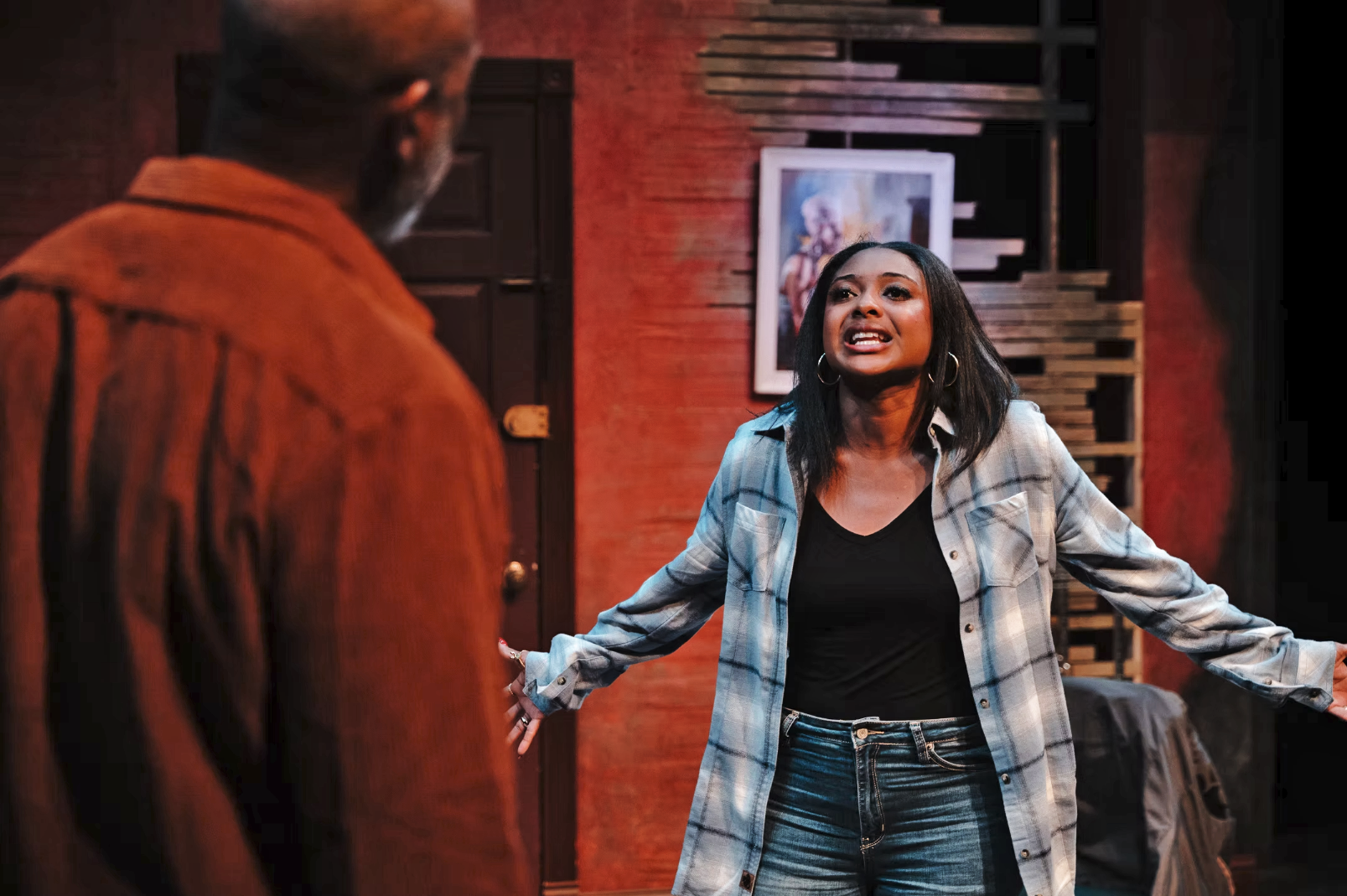“Sunset Baby”: Love Letters from 60s Rebels—at Lorraine Hansberry
Courtney Gabrielle Williams
Dominique Morisseau Asks: What Price for Black Liberation?
by Mary Lou Herlihy & Barry David Horwitz
“Sunset Baby” lays bare the cost of fighting the good fight. What did it cost 60s Black Panther leaders to rebel against decades of oppression?
For Nina, the daughter of two Black revolutionaries (precise Courtney Gabrielle Williams), life is con games and poverty. Williams’ layered, unflinching performance shows us many Ninas: hustler, wounded daughter, and needy woman. Her world is brutal and abusive.
Nina lives in a dilapidated apartment where light and cold seep through the decaying walls. The furniture looks borrowed from a college dorm—milk crates, plastic cups, paper bowls. The door buzzer shocks like a slap to the face, reminding us that peace never settles here. A life interrupted.
Lamont Thompson and Titus VanHook
What Nina treasures most are her mother’s unsent letters to her father, Kenyatta (stoic Lamont Thompson). These words on paper mean more to her than money, more than survival. The letters, a currency of love and loss, prove that her mother saw her, even if her father did not.
For Kenyatta, the letters represent redemption, memory, and legacy. The tension between them builds as Nina refuses to share her hidden treasure, in revealing, emotional father/daughter encounters.
When Damon (steely Titus VanHook), her gangster-style boyfriend, storms in like a tornado, Nina becomes detached. Damon dumps his chaos on her, his self-absorption epic and comical. He knows how to break down her defenses: “Tell me you need me,” he demands, trapping her in an embrace. She resists, but he presses the bruises—she relents.
Titus VanHook and Courtney Gabrielle Williams
Dad Kenyatta, once a Black revolutionary, returns as a man of lofty words. In recordings and speeches, he comes across as poetic and fearful. But we miss the contradictions of a prophet and deserter who was wrongfully imprisoned.
When the long-lost father calls her by her name, she snaps, “Do not fucking call me Nina!” Named after Nina Simone with high hopes, now she violently rejects him, resenting his abandoned hopes for her future.
Director Margo Hall’s choices deepen Nina’s journey. Her makeup scenes are mesmerizing—she takes her time, fully transforming before our eyes. At one moment, she’s building her armor; at another, she’s vulnerable, childlike. In one chilling scene, she tucks a gun into her jeans as casually as lipstick. Chillingly, Nina aims the gun at her father, demanding truth.
Courtney Gabrielle Williams and Lamont Thompson
The three characters cannot trust. Damon ransacks the place, searching for the valuable letters. Kenyatta goes behind her back. Both men betray her as she tries to hold onto her mother’s secrets.
With pounding street beats, Nina Simone’s aching voice becomes the soundtrack for longing and hustle, beauty and survival.
The letters symbolize the history of Black liberation, pursued by historians. How will Nina keep them from profane hands? Can she escape the demands of men? Here is a beautiful woman, trapped between past and present, trying to liberate herself.
“Sunset Baby” reminds us that revolutions are fought not only in the streets but also in our homes. It’s a gripping journey into the past that still shapes our present.
“Sunset Baby” by Dominique Morisseau, directed by Margo Hall, scenic design by Carlos-Antonio Aceves, lighting by Michael Combs, costumes by Jenn Stephens, sound by Alex Fakayode, by Lorraine Hansberry Theatre at Magic Theatre, Fort Mason, San Francisco.
Info: lhtsf.org - to September 28, 2025.
Cast: Courtney Gabrielle Williams, Titus VanHook, and Lamont Thompson.




